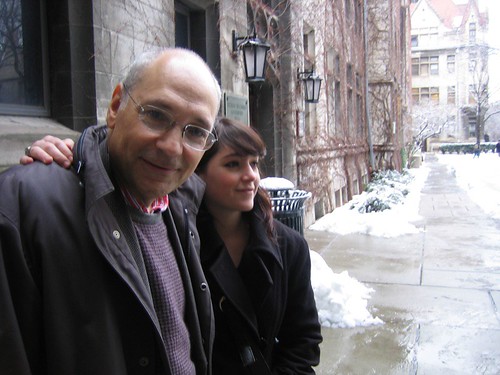Today we'll continue an aesthetic thread that, for us, began with some of the later John Giorno poems we looked at and then carries on through Jackson Mac Low and Hannah Weiner — namely, texts that, either through their presentation on the page or their realization in performance, stress a polyvocal approach to poetry, with multiple voices that complement or even compete with one another.
 |
| Ann Lauterbach (left) and John Ashbery (right). |
First up, we have a 1980 recording of the first section of John Ashbery's "Litany" (first published in 1979's As We Know), which famously provides readers with these instructions: "The two columns of 'Litany' are meant to be read as simultaneous but independent monologues." Of course such things are impossible for a solitary reader, but when reimagined as a stereo multitrack version (with Ashbery reading the left column and poet Ann Lauterbach the right), we finally hear the poem as it was intended to be received, though at the same time suddenly lose access to much its semantic content as we try to pay attention to the two voices at once. Ironically, in several readings around the time of its release, Ashbery offered less proscriptive takes on how the poem could be performed, and he himself tended to either jump from column to column as he saw fit, or to read the left and right pages sequentially. "Litany," Part One [PDF, MP3]
 |
| Susan Howe and David Grubbs. |
Next, we'll look at two tracks from Thiefth, a 2005 CD release by poet Susan Howe and multi-instrumentalist David Grubbs, which features complex performances of two of Howe's historical investigations — "Thorow" [PDF] and "Melville's Marginalia" [excerpt: PDF] — with musical accompaniment and voice manipulation (via the MAX/MSP software). The album's liner notes provide more background on the collaboration:
Thiefth is the first collaboration between poet Susan Howe and musician and composer David Grubbs. The two were brought together when the Fondation Cartier proposed a collaborative performance. Grubbs had been an ardent reader of Howe's for more than a decade, and the opportunity to work with Howe's poetry and her voice immediately intrigued. In late 2003, the two set about to create performance versions of "Thorow" and "Melville's Marginalia," two of Howe's longer poems.
Drawing from the journals of Sir William Johnson and Henry David Thoreau, "Thorow" both evokes the winter landscape that surrounds Lake George in upstate New York, and explores collisions and collusions of historical violence and national identity. "Thorow" is an act of second seeing in which Howe and Grubbs engage the lake's glittering, ice surface as well as the insistent voices that haunt an unseen world underneath.
"Melville's Marginalia" is an approach to an elusive and allusive mind through Herman Melville's own reading and the notations he made in some of the books he owned and loved. The collaging and mirror-imaging of words and sounds are concretions of verbal static, visual mediations on what can and cannot be said.
You'll find PDFs of the texts at the links above, and you can listen to the album's individual tracks (along with several later collaborations including "Souls of the Labadie Tract" and "Frolic Architecture") on PennSound's Howe/Grubbs author page.
 |
| Charles and Emma Bee Bernstein |
We'll also visit again briefly with Charles Bernstein, taking a look at a pair of pieces from diverse periods in his career. First, listen to "Piffle (Breathing)" [MP3] — another track from Class (you've already listened to "Class," "My/My/My," and "Goodnight"), which was recorded with Greg Ball and Susan Bee Bernstein in 1976. Then we'll jump forward to the 2003 poem "War Stories" and a two-voice rendition of it performed with the poet's daughter, Emma [poem and MP3 here]
 |
| The Velvet Underground in 1969 around the release of their third album: (left to right) Doug Yule, Lou Reed, Sterling Morrison, and Maureen Tucker. |
Finally, we've already talked a little bit about the Velvet Underground's Lou Reed recently, taking a look at some of his more narrative songs, but today I'd like to take a look at one of that band's more infamous tracks, "The Murder Mystery" (taken from their self-titled 1969 album). This nine-minute track exploited the stereo medium with Reed and guitarist Sterling Morrison reading separate competing lyrics in the left and right channels during the verses, with drummer Maureen Tucker and bass/keyboard player Doug Yule trading off overlapping vocals on the choruses. Reed would later publish a version of the lyrics in The Paris Review in 1972, but this version comes from his collected lyrics, Between Thought and Expression: [PDF]

No comments:
Post a Comment